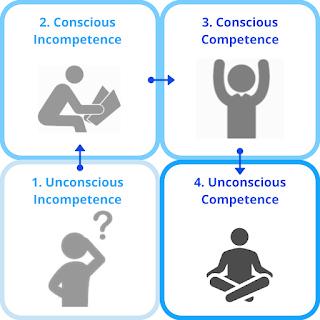The Four Stages of Learning: A Roadmap to Mastery
The Four Stages of Learning: A Roadmap to Mastery
Introduction:
Learning is a lifelong journey,
and understanding the stages of learning can significantly enhance the process
of acquiring new skills and knowledge. Psychologist Noel Burch introduced the
"Four Stages of Learning" model, providing a framework that outlines
the progression individuals go through as they acquire new abilities. Whether
you're picking up a new language, mastering a musical instrument, or honing
professional skills, recognising these stages can help you navigate the
challenges of learning and stay motivated on your path to mastery.
The NLP toolset is the essential
toolset to bring the 4 stages to life, starting with the operational presupposition
- NLP is not a model of repair... it is a model of acquisition ... a
generative model. It states that people are not broken and do not need
fixing. Human beings work perfectly and everything they do represents an
achievement. The methodology and technology of NLP does not focus on what's
wrong or diagnosing people: rather, it's about how to get to where you want to
go. Lets look at the 4 stages:
1. **Unconscious Incompetence: The Ignorance
Phase**
In the initial stage, individuals
are unaware of their lack of competence in a particular skill or knowledge
area. This is the stage of "unconscious incompetence." It's
akin to being in the dark about what you don't know. This phase can be a
comfortable yet deceptive state, as ignorance can shield you from the
challenges that lie ahead.
To progress beyond this stage,
self-awareness is key. Recognising the gaps in your knowledge or skills is the
first step toward improvement. Feedback from mentors, teachers, or peers can be
invaluable in helping you move from unconscious incompetence to conscious
incompetence.
2. **Conscious Incompetence: The Awareness
Phase**
As you move into the second
stage, "conscious incompetence," you become acutely aware of
your lack of proficiency in a particular area. This is a critical turning point
in the learning process, where the acknowledgement of your shortcomings fuels
the desire to improve.
During this phase, it's common to
experience a range of emotions, including frustration and impatience. However,
it's essential to embrace these feelings as part of the learning journey. This
stage is marked by a conscious effort to gain knowledge and refine skills.
Engaging in focused practice, seeking guidance, and setting realistic goals are
effective strategies for progressing through conscious incompetence.
3. **Conscious Competence: The Proficiency
Phase**
With sustained effort and
practice, you transition to the "conscious competence" stage.
In this phase, you can perform the skill or apply the knowledge, but it
requires concentration and conscious effort. This is a critical step toward
mastery, as you begin to see tangible progress and your abilities improve.
During conscious competence,
practice becomes more refined, and you start to build a level of confidence in
your abilities. It's crucial to remain focused and continue practising
deliberately to solidify your skills. Repetition, feedback, and continuous
learning contribute to the development of proficiency.
4. **Unconscious Competence: The Mastery
Phase**
The final stage of learning is "unconscious
competence," where the acquired skill or knowledge becomes second
nature. Mastery is achieved when you can perform the task effortlessly, without
conscious thought. This level of proficiency often comes with experience,
repetition, and a deep understanding of the subject matter.
At this stage, individuals may
find joy and satisfaction in their abilities. It's essential to continue
learning and refining even in the mastery phase to prevent complacency and stay
current with advancements in the field. Often overlooked is that without
regular skills review it is easy to drift back into “unconscious incompetence”.
Conclusion:
Understanding the four stages of
learning provides a roadmap for navigating the complexities of acquiring new
skills and knowledge. Embracing the challenges of each stage, setting realistic
goals, seeking feedback, and maintaining a growth mindset are crucial elements
for success on the journey to mastery. Whether you're a student, professional,
or lifelong learner, recognizing where you are in the learning process can
empower you to make informed decisions and progress toward your goals.
Please keep this next NLP
operational presupposition in mind as you continue your learning and
development journey
There are no mistakes in
communication, rather, mistakes are feedback without which
flexibility and variability would not be possible. Mistakes are an integral
part of the readjusting process... an essential part of the learning
process. Mistakes are viewed as opportunities to learn. Each experience is
viewed as an unprecedented opportunity to learn.
If you’re
interested in finding out more, and even training in NLP, please do contact me.
Mark.peters@balancedapproach.co.uk
Mob/whatsapp:
+44 (0)7831 743737
Web: https://www.balancedapproach.co.uk
Mark Peters
is one of a small number of people who have earned the title of Master Trainer
for the Society of NLP. As of November 2023, he is an owner of the Society of
NLP.




This is perfect! I have just started a new job role with my organisation and this could not be more relevant! Explained so beautifully and articulately, abd easy to understand. I'm going to print this out for my work as I think this will help alot of people. Thank you Mark😊
ReplyDeletefantastic, and congrats on your new job
Delete